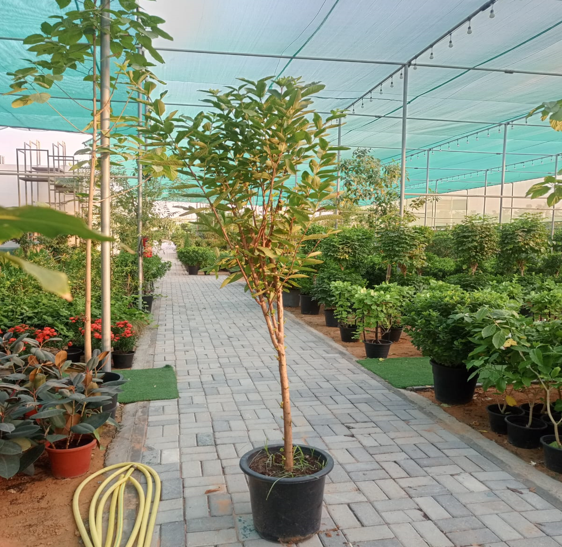Guava plant (Psidium guajava) is a tropical fruit tree known for its delicious and aromatic fruits. Here’s a comprehensive overview:
Description of Guava plant
- Appearance: Guava trees are typically small to medium-sized, growing up to 10 to 30 feet tall. They have a bushy, spreading form with a dense canopy.
- Leaves: The leaves are simple, elliptical, and can be dark green and glossy. Young leaves often have a reddish tint.
- Flowers: Guava produces fragrant white or pale yellow flowers that have many stamens, attracting various pollinators like bees.
- Fruit: The fruit is typically round or oval, with a thin skin that can be green, yellow, or pink, depending on the variety. The flesh is sweet and aromatic, often containing small, edible seeds.
Habitat and Growth
- Native Range: Guava is native to tropical and subtropical regions of Central America and South America but is now cultivated in many tropical and subtropical areas worldwide.
- Climate: It thrives in warm, sunny climates and prefers USDA hardiness zones 9 to 11. Guava is sensitive to frost.
- Soil: The plant prefers well-drained, sandy loam or clay soils rich in organic matter. It can tolerate a range of soil types but does best in fertile conditions.
Uses
- Culinary: Guava is enjoyed fresh, juiced, or used in jams, jellies, and desserts. It is also used in savory dishes in some cuisines.
- Nutritional Value: Guava is rich in vitamin C, dietary fiber, and antioxidants, making it a healthy addition to the diet.
- Medicinal: Traditionally, guava leaves have been used in herbal remedies for various ailments, including digestive issues and skin conditions.
Care and Maintenance
- Watering: Guava trees require regular watering, especially during dry spells, but they should not be waterlogged. Deep watering encourages strong root development.
- Fertilization: Fertilizing during the growing season with a balanced fertilizer can promote healthy growth and fruit production.
- Pruning: Regular pruning helps maintain shape, encourages air circulation, and can improve fruit yield.
Pests and Diseases
- Guava trees can be susceptible to pests such as fruit flies, aphids, and scale insects. Fungal diseases like root rot and leaf spot can also occur, especially in wet conditions. Good cultural practices and pest management strategies can help mitigate these issues.
Harvesting
- Guava fruit is typically harvested when it is fully ripe, indicated by its color and slight softness when gently squeezed. Ripe guavas can be eaten fresh or used in cooking.
have a look at our outdoor plant collectionhttps://mfourgreen.com/product-category/outdoor-plants/

Reviews
There are no reviews yet.